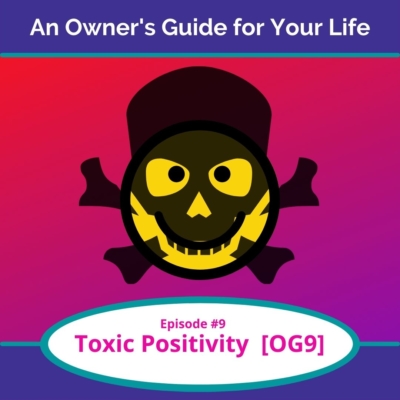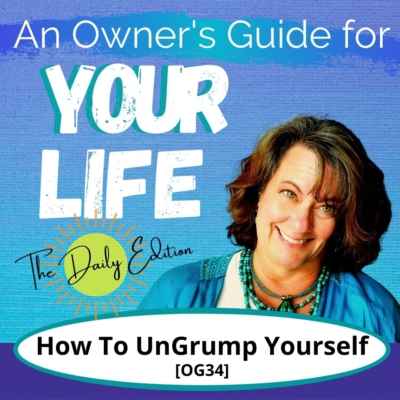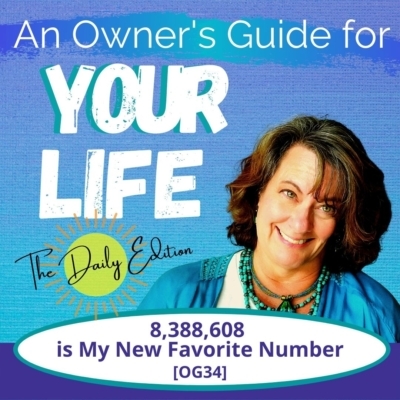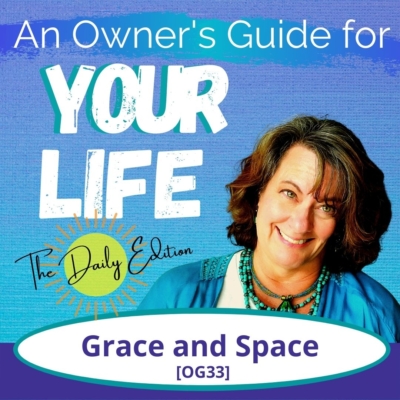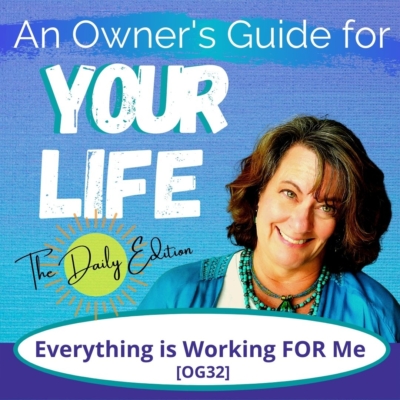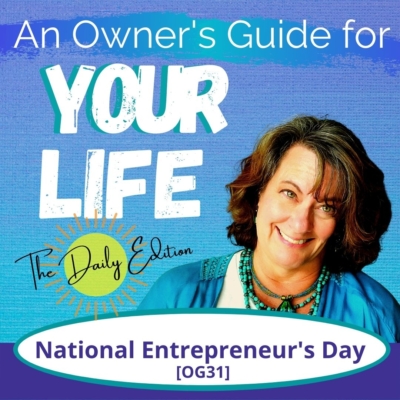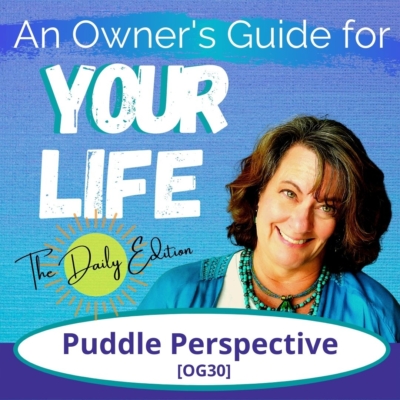Toxic Positivity
Intro:
Don’t you really just want to be happy? However we define happiness, it is something that most people want. Whether we’re actually feeling happy in this moment or trying to numb our unhappiness or chasing hard after what we think will bring us happiness, the pursuit of happiness permeates much of life.
But how much is too much? When does it go too far?
When is it toxic to be positive?
Hey, I’m glad you’re here. This is episode 9 and we’re talking today about toxic positivity.
We’ve all been there.
You lose something you love. A person, a pet, a job.And you’re grieving for your loss. And there are well-meaning people around you who care about you and they say things like,
“It could be worse.”
“Count your blessings.”
“Look on the bright side.”
Oh, and here’s a favorite, “Everything happens for a reason.”
And how do you feel now?
You feel WORSE. They’re trying to help you feel better but you feel worse.
You’ve got feelings like grief and anger and fear. You’re unsure of your future and you feel sad but now you’re being told to look PAST those feelings, just overlook them and focus on the positive.
This is toxic positivity.
When we focus on having a positive mindset NO MATTER WHAT.
It’s positivity at the expense of all our other feelings. Being positive at any cost.
Toxic positivity has us denying reality. And that’s not healthy.
Now I want to be clear about something. I LOVE being positive. It’s my natural bent. I’m an optimist. It’s easier for me to smile and be upbeat than not. I’d rather smile than frown. I like to look at the bright side of life. I like to feel good. But NOT at the expense of all my other feelings.
I believe that what I focus on flourishes.
I believe that positive energy attracts more positive energy into my life so, of course, I want more positive energy. Who wouldn’t?
If you want help finding silver linings, I’m your girl.
But I’m also really good at sitting quietly.
Or thoughtfully helping you process something that makes you uncomfortable.
I’m good at helping people with the hard stuff in life
and explore what it is you really want from life.
They’re not mutually exclusive, these feelings, this ability.
You can feel sad AND hopeful. You can be frustrated AND determined. You can have positive and negative things going on.
Here’s a personal example from my own life. Years ago, many years ago, I had my first miscarriage, I was in the early days of my first trimester. It was my first pregnancy and my husband and I, oh my gosh, we were so excited. But on that day when they couldn’t find the baby’s heartbeat, it was devastating.
Over the next weeks, as we grieved the loss of a child we would never hold, someone said this to us, “You’re young- you’ve got plenty of time to have more babies.” Which was true, it turned out to be true- years later we wound up with 3 sons. But at the time, it didn’t help me recognize and cope with my sadness and loss.
Someone else commented, actually I think more than one person said this to me and my husband,
“Think of all the fun you’ll have trying to get pregnant again.”
which was also not helpful. I did not want to think about sex when I’m grieving my baby.
These were people who wanted to help me feel better. They weren’t trying to hurt me.
But, you know in our society, we are pretty uncomfortable with discomfort.
It can be hard to know what to say to someone who’s hurting.
So many times we’re like “Just look on the bright side” kind of comforting instead of saying “I’m sorry you’re hurting” or even sitting there quietly.
We want to solve a problem and we want to move as fast as we can into goodness instead of simply BEING THERE.
You know a topic has hit the mainstream when Newsweek has an article about it. Just the other month, Newsweek published this article called How Toxic Positivity Affects Us.
And we all know we live in a society where social media is huge. It’s pervasive and it sure doesn’t help with this overwhelming culture of “be positive at any cost” We’ve got influencers, we’ve got our own friends. We expect to see this over the top happiness and this polished perfection when we see a commercial or we see an ad so we’re a bit more on guard with that. But influencers don’t feel like ads. They’re in our Instagram feed beside our friends. And they show us polished perfection. There’s happy lives with no room for negativity. And even the regular folks we know- most of us are out there sharing our high spots, not the low spots.
We wind up comparing our behind the scenes mess that we are intimately acquainted with, we know every bit of all the crap we deal with, we’re comparing that to their filtered, photoshopped highlight reels.
It’s an unfair comparison. Apples to oranges.
But our brains don’t see it that way. So our hearts don’t feel it that way.
So what do we do when we’re confronted by toxic positivity?
The most important piece of advice I can give you is to FEEL WHAT YOU FEEL.
Emotions themselves aren’t good or bad, they just are.
It’s our thoughts about them. The stories we tell ourselves about our feelings and what’s going to happen because we feel this way, that’s what turns them into positive or negative.
Toxic positivity tends to label feelings very quickly- positive or negative, good or bad.
And difficult feelings feel bad. And if it’s bad, we need to ignore or rush through the feeling to get to the other side.
Some typical responses to difficult emotions tend to be three things here: bottle, brood, or bust through it.
You know what it looks like when somebody bottles up their emotions. It’s pretty easy to picture a guy who has the beet red face, his teeth are clenched, his jaw is tight. He is physically clamping his body down around his anger. And then what happens? We know, you bottle enough there’s going to be an explosion.
Somebody who’s brooding over their feelings. It’s all they want to think about. There’s no room for looking up for the positive because they’re consumed with looking in.
When I think of someone busting through, I think of walking into a spider web. You feel it come across your face and you frantically wipe and fling it away from you, get it off and wipe your head and face a few more times to be sure there’s no spider hanging out. You don’t waste time, you sure don’t linger here. Get it out and off as fast as you can.
So bottle, bust through or brood, they aren’t the only responses but they’re frequent. And they tend to be very rigid. They’re rigid responses to emotions.
The alternative is to be AGILE in responding to your emotions.
To take time to experience what you’re feeling and act in ways that serve you
Dr Susan David, she’s a Harvard psychologist and business consultant, she says (and I love this quote)
“Emotions are data, not directives.”
Let me say that again.
Emotions are data, not directives.
Be curious about what your emotions are telling you. She calls them ‘signposts’- directional signs that lead you somewhere, not commandments written in stone.
Your feelings are telling you something about what you need and what you value.
You are not at the mercy of your feelings. You can explore them and decide what to do with what you find.
There are studies that show denying our feelings leads to more stress on our body and makes it HARDER to avoid distressing thoughts and feelings
There’s one study, I’ll tell you about it quickly, they showed video of disturbing medical procedures and they measured stress responses of the participants, like their heart rate, how dilated their pupils got, how much they sweated, so fun stuff.
They had two groups and gave different instructions to each group. One group was told to watch these procedures and let their emotions show. The other group was told, “Watch this but act like nothing is bothering you.”
Would it surprise you at all to hear that the group who was told “act like nothing is bothering you” had significantly more physiological arousal? Like the ducks in the pond behind my house, they looked calm and collected on the surface but they were paddling frantically below the surface.
These types of studies show us that expressing our RANGE of emotions (even the “not-so-positive” ones, even the difficult ones) helps us regulate our stress response.
But toxic positivity doesn’t encourage you to explore your emotions.
It discourages you from feeling anything except positive feelings.
That’s not practical. It’s not realistic.
It completely flies in the face of what normal life is like with ups and downs, ebbs and flows.
Now there’s a phrase used by Acceptance and Commitment Therapists (ACT). They call this having Dead People Goals. Anything a corpse can do better than a living person is a dead people goal. Never yelling, not overeating, don’t feel depressed. Get the idea?
We don’t want dead people goals,
We want Living People’s Goals.
Remember that it is up to you to decide what you do with your feelings.
When you own your life, you get to decide how to respond to things people say, what to do in your circumstances, what actions to take in response to your thoughts and feelings.
YOU are responsible for your life.
You decide what to do with the things people say, even the well-meaning ones who only want us to not hurt and to feel better.
Feelings- the fun, light, easy ones AND the difficult, heavy, deep ones- they are all part of our human existence. They make life rich and complex and worthwhile.
I want to end with this story I heard. This old farmer saying a prayer at his church breakfast starts off saying,
“Lord, I don’t like buttermilk.”
(and as a sidenote I’ll tell you that is not how a typical prayer starts)
“Lord, I don’t like buttermilk.
And you know I’d spit out a spoonful of Crisco shortening.
And I sure don’t eat plain white flour by itself.
But when you mix it all up and bake it in the oven,
it turns out some mighty fine biscuits.
And I do like biscuits.
So Lord help me to remember when life is hard and I don’t like what’s happening right now,
That You just might be making me some mighty fine biscuits.”
Toxic positivity would have us missing out on the mighty fine biscuits of life.
So take the time to feel what you feel and see where it takes you.
Thank you for listening! I’d be honored if you’d share my podcast with a friend.
Now let’s go live, love, make some money and change the world!
